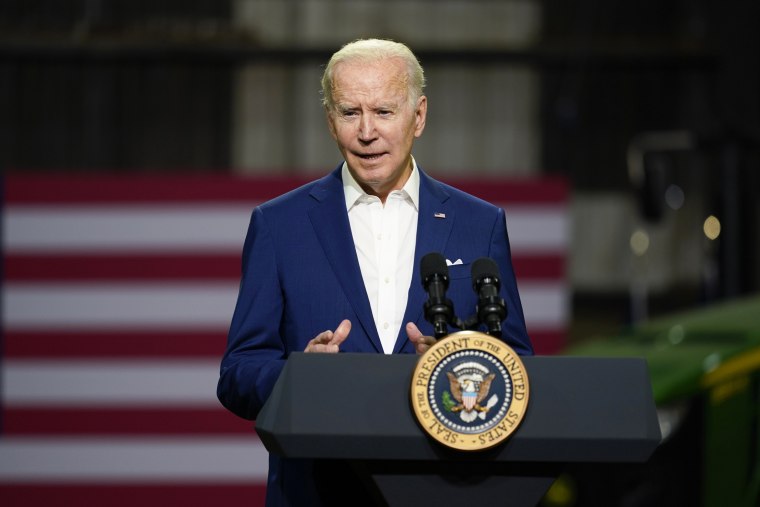National Republican organizations are thinking big ahead of November’s midterm elections, making a show of expanding the number of districts held by Democrats they intend to target. By contrast, President Joe Biden’s White House is “thinking small,” according to The Associated Press.
This new strategy has the considerable advantage of reckoning with reality.
Battered after spending more than a year talking up “transformational plans that are so far only aspirational,” the AP dispatch read, the White House is reportedly shifting tactics. It will focus on promoting “smaller, discrete” achievements in an effort to energize the party’s base and convince persuadable voters not to hand the keys over to the GOP.
This new strategy has the considerable advantage of reckoning with reality. An evenly split Senate and the narrowest of House majorities — a feature of life in Washington the administration seemed to believe they could talk out of existence — were never conducive to a radical transformation of the national social compact. The admission that what the White House considers “big” is off the table is, however, an indictment of how the administration’s political operation has functioned from the start.
A year ago, the new administration set out on a determined course to “underpromise and overdeliver,” as The New York Times put it. Particularly when it came to managing the pandemic, the White House consciously tried to avoid what it believed was former President Donald Trump’s mistake: making bold predictions that often came to nothing. By contrast, Biden set easily achievable goals and deadlines — to a fault. Biden’s speech heralding 2021’s “summer of freedom” from the virus came and went without much notice since his own Centers for Disease Control and Prevention had withdrawn masking guidance over a month earlier amid declining case rates. That fall’s return of the virus made the event seem foolhardy in retrospect, further convincing the White House of the wisdom of circumspection.
There’s plenty of mythmaking here. By and large, the Biden administration spent its first-year overpromising and underdelivering. It played down its genuinely sizable achievements in the process of promoting evermore transformative adjustments to the American social and economic landscape.
“By concentrating on governing, Biden is taking the presidential model back to an earlier time where problem-solving mattered,” Brookings Institution senior fellow Elaine Kamarck gushed on the occasion of the president’s first 100 days in office. But even as she admired the administration’s relentless competence and commitment to “under-promising and over-delivering,” she outlined the administration’s many big promises.
Confronted with a migration crisis at the southern border, the vice president’s office was tapped to “address the root causes of migration,” such as global poverty; no small feat if she or anyone else could achieve that, which they could not. The administration also pledged “comprehensive action to root out systemic racism” in the federal government: a phenomenon that is by definition subtle enough to be difficult to identify, much less extirpate. The president entered office on the back of bold promises to reduce the nation’s reliance on fossil fuels, but he’s spent the last six months berating fossil fuel producers over their failure to bring enough product to market while regularly tapping into the Strategic Petroleum Reserve (a dynamic environmental activists bitterly resent).
Biden’s set piece legislative goal — what eventually came to be known as the Build Back Better agenda — was promoted by the president as “transformative.” Biden initially sought no less than $4 trillion from Congress to renovate the nation’s hard infrastructure; write universal prekindergarten and “free” community college into the national contract; throw hundreds of billions of dollars in the general direction of climate change; end the decline of “local” news organizations; arrest the trend against unionization; and reverse the effects of globalization on the American job market. Those are a lot of ambitious projects, and none came to fruition.
All these grandiose ideas eclipsed the administration’s genuinely significant achievements.
Moreover, all these grandiose ideas eclipsed the administration’s genuinely significant achievements. In his first weeks, Biden signed into law a $2 trillion Covid relief package that included the largest one-time stimulus in American history. The administration’s reluctant concession to political realities in Washington compelled it to carve off the “hard infrastructure” from his Build Back Better agenda, and it, too, became law. Biden’s White House is currently administering the largest single investment in U.S. infrastructure ever, and the president has overseen a competent Covid vaccine distribution program. Its success has rendered this coronavirus, which still terrorizes much of the world, endemic in several populous American states.
The president has always been tempted by the idea that he could come to be seen by posterity as a giant of American politics on par with Franklin Roosevelt or Lyndon Johnson. The political environment was never favorable to this White House’s big ideas, and the administration unnecessarily sacrificed a lot of political capital by repeatedly dashing itself against that immovable object. The Biden White House never behaved like an administration that “underpromised” on much of anything.
Now that the consequences of this strategy are looming disastrously large, the AP reports that “Biden is under pressure to recalibrate his ambitions.” Even the president’s allies cannot describe this tactical shift without making it sound like an ignominious retreat. “Did we accomplish everything we wanted to? No,” said Eric Schultz, an official in the Obama White House who described how it navigated similar political conditions. “But did we roll up our sleeves every day and push the needle forward? Yes.”
Democratic voters aren’t going to give the White House an “A” for effort. “Well, we tried,” is not a call to action. The Biden White House has proven it is constitutionally incapable of thinking small, even when it knows it should. As such, the pivot they’re presently retailing is unlikely to stick. But the first step to fixing a problem is admitting you have one.

